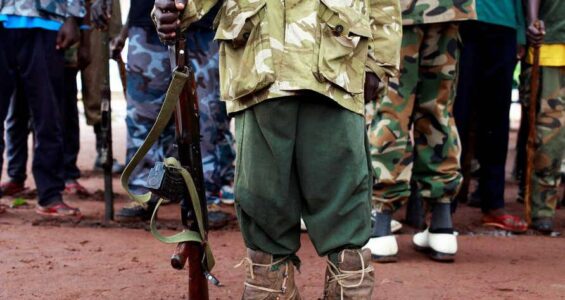
Islamic State-linked group is using child soldiers in Mozambique
An Islamic State (ISIS) linked armed group in northern Mozambique is kidnapping boys and using them to fight government forces in violation of the international prohibition on the use of child soldiers, Human Rights Watch said today.
The armed group, known locally as Al-Shabab, has abducted hundreds of boys, some as young as 12, trained them in bases across Cabo Delgado province, and forced them to fight alongside adults against government forces. In the town of Palma, parents said that they watched their sons wield guns when they returned with other fighters to raid their village.
“Using children in fighting is cruel, unlawful, and should never take place,” said Mausi Segun, Africa director at Human Rights Watch. “Mozambique’s Al-Shabab should immediately stop recruiting children and release every child in their ranks.”
Human Rights Watch spoke by phone with four parents of kidnapped boys, a former child soldier, and two witnesses to abuses. The child soldier and witnesses had escaped from the Al-Shabaab training base in the town of Mbau, where they were held captive for several weeks. Their accounts are consistent with media reports that the armed group was kidnapping boys to be fighters.
A 42-year-old man said that seven Al-Shabab fighters kidnapped his 17-year-old son during their March 24 attack on Palma. He said the gunmen found his family of seven on a farm where they had been hiding for two days from the fighting.
“I was on my knees begging the Mashababos [the local popular name for Al-Shabab] to take me instead, while my wife grabbed my boy’s trousers to stop him from walking away,” the man said. “One of the men hit my wife in the head with an AK-47 [assault rifle] to force her to release [our son], while the other man threatened to kill all of us if we didn’t allow the boy to go.” The boy’s mother, 36, said she saw him again in May, just before the family abandoned Palma to seek refuge elsewhere.
“I was hiding inside the house when I heard his voice and I checked outside the window,” she said. “I saw him in a group of about a dozen other boys, all wearing camouflage trousers and a red band around the head.”
Two other women said that Al-Shabab had abducted their sons during the raid on Mocimboa da Praia in August 2020 that culminated in the seizure of the port town.
Three women who escaped from an Al-Shabab base in Mbau said that there are “hundreds of boys” in the ranks of the group. “They behave like adult men, even picking ‘wives’ among the kidnapped girls,” one woman said.
Another woman who escaped said that Al-Shabab forces abducted her in March from Palma and that the armed group drove her and hundreds of women and boys in three trucks to Mocimboa da Praia, where they were kept captive. “The boys were taken for military training in Mbau and Macomia,” she said. “After training they were brought to back to receive Islamic classes and instructions for attacking villages.”
A young man said that he was under 18 in April 2020 when six Al-Shabab fighters found him and two 16-year-old friends hiding in a farm during an attack on Mocimboa da Praia. The fighters argued about what to do with the boys and considered beheading them because they considered their “hair styles” against Islam. Instead, they forced the boys to walk blindfolded for many kilometers inside the forest to the fighters’ base in Mbau.
“We joined many other men and boys and were trained on how to use guns and knives to fight,” the young man said. “They told us that we had to kill and fight for our land and to protect our religion, which is under attack in Mozambique.”
He escaped a month later, while on patrol duty, and now lives in fear of being recaptured by the armed group.
In June 2021, the humanitarian organization Save the Children estimated that non-state armed groups in Cabo Delgado had abducted at least 51 children, most of them girls, over the past year. A local group, Observatório do Meio Rural (OMR), reported that kidnapped boys were expanding the ranks of armed groups in the area.
The United Nations Optional Protocol to the Convention on the Rights of the Child on the involvement of children in armed conflict, which Mozambique ratified in 2004, prohibits non-state armed groups from recruiting children under the age of 18. The Rome Statute of the International Criminal Court categorizes as a war crime the conscription, enlistment, or active use of children under 15 years old in active hostilities during armed conflict.
“Al-Shabab’s growing use of children as fighters is the latest horrifying chapter in the Cabo Delgado violence,” Segun said. “Mozambican authorities should urgently take steps to protect children, so they remain with their families and in school, and aren’t exploited as weapons of war.”
Source: HRW





